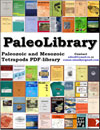August 11 , 2016
by Antonia Ramsay
Chinese palaeontologist Xu Xing currently holds the distinction for naming the most dinosaur species, having tirelessly studied and hunted for these extinct animals since 1991.
He is a top specialist in his field in China and is frequently consulted by colleagues from around the globe. In July, Xu Xing could be found digging near Canada’s Alberta/British Columbia border continuing his research into how dinosaurs evolved into birds.
We dug into our archives to excavate this timeless interview from 2007 with Xu Xing, the world’s great dinosaur hunter, and one of the few palaeontologists to star in a Toyota car commercial...
New branch of science in China
Holding a degree from Beijing University and currently working as a researcher at the Beijing Institute of Vertebrate Paleontology and Paleoanthropology (IVPP), Xu Xing specialises in the study of feathered dinosaurs, the ancestors of our modern-day bird species.
Holding the bone of an early tyrannosaurus that lived some 160 million years ago, he reveals that this particular find has not yet been made public to the scientific community. I feel privileged to be one of the very first people to see it.
Palaeontology is a relatively new branch of science in China that is still undergoing strong development. Lagging behind England, the US and Canada, China is missing an entire generation of scientists, which Xu blames on the Cultural Revolution (1966-1976). For that reason, today’s researchers, like Xu (born in 1969), are fairly young.
“For some reason, China has many locations that are rich in not only dinosaur remains, but also in even earlier lifeforms. China is a fascinating place to study palaeontology and has produced many of the world's most interesting finds,” Xu says.
A global science
Swedish scientists Sven Hedin and Gunnar Andersson, along with their Chinese colleagues, discovered at the beginning of the 20th century that well-preserved, nearly intact fossils could be found in abundance in western China.
One of richest territories in terms of palaeontology research is Xinjiang, close to the Gobi Desert in northern China and southern Mongolia. Digging at the site has been going on since 2000 and Xu believes that there still remains a lot to be discovered in the area.
In 2007, Xu organised an excursion to the, with a group of prominent international researchers. The personal calendar of this busy man of science is also full of engagements to speak at seminars in China and abroad.
He believes that palaeontology is a global science, which is inherently based on the practice of comparing study results and findings with other scientists from around the world.
Tracing the evolution of birds
Liaoning, a north-eastern Chinese province bordering North Korea and the Yellow Sea, is a fantastic, unparalleled treasure chest for dinosaur researchers, Xu says. Here scientists have been able to find fossils in near perfect condition, as well as entire skeletons.
Some of the fossils dug up in the region have also had the unique feature of containing remnants of feathers and hair. Xu says that this is the only place on earth where these types of fossils can be found. Given his profession as a specialist on bird-like dinosaurs and their evolution, this gives Xu an especially good reason to be excited.
“Birds continue to fascinate palaeontologists and [since 1997] we've discovered ten new species which will help us better understand their development,” Xu says.
One of his most noteworthy discoveries were the remains of a dinosaur nicknamed "Mei Long", found huddled in a nest in Liaoning. Like many of the other fossils, this too was in near perfect condition.
“Many of the finds are very significant in terms of tracing the dinosaur lineage and are amazingly well preserved. Such was the case of "Mei Long," which we call the ‘sleeping dinosaur’. When we found the fossil in question, we could not believe our eyes. The skeleton was very well preserved and nearly complete. The remains were found in a nest in the same position as a sleeping bird would be,” Xu says.
At present, China is the only place where a feather-covered dinosaur has ever been discovered, but Xu believes that more may be found in other parts of the world, with some luck.
Twenty new dinosaur species
While many of his fellow scientists recollect being fascinated by dinosaurs since childhood, Xu barely knew what ‘palaeontology’ meant back then. When he was assigned a study place in the Department of Palaeontology at university, he initially remained quite indifferent towards this branch of science.
“Once I was able to dedicate more time to the concrete study of fossils, I became more enthusiastic about this field and started thinking that it was actually quite exciting. But luck also has a lot to do with it. While working as a researcher out in the field, I just happened to find one dinosaur fossil after another, which naturally helped to fuel my interest,” Xu admits.
Xu Xing has now named more new dinosaur species than any other person in the world, naming over twenty new dinosaur species in the space of ten years. Whether this is due to the hectic rate at which Chinese scientists are expected to publish new research articles or just sheer luck, Xu cannot say.
Today, palaeontology and dinosaur fossils are an important part of Xu's life, so much so that sometimes his wife and children seem to play second fiddle to his consuming work, judging by the comments he sometimes hears at home.
Xu says that he still has a lot to accomplish as a scientist. When he undertook his first research project in 1991, he had trouble finding the smallest trace of a fossil. Needless to say, today the situation is completely different.
"You cannot even imagine how many fossils I have now. In my room alone, I have the fossils of five previously undiscovered dinosaur species awaiting scientific description. This is a really great time for us palaeontologists,” Xu exclaims.
http://gbtimes.com/life/xu-xing-worlds-great-dinosaur-hunter
|

